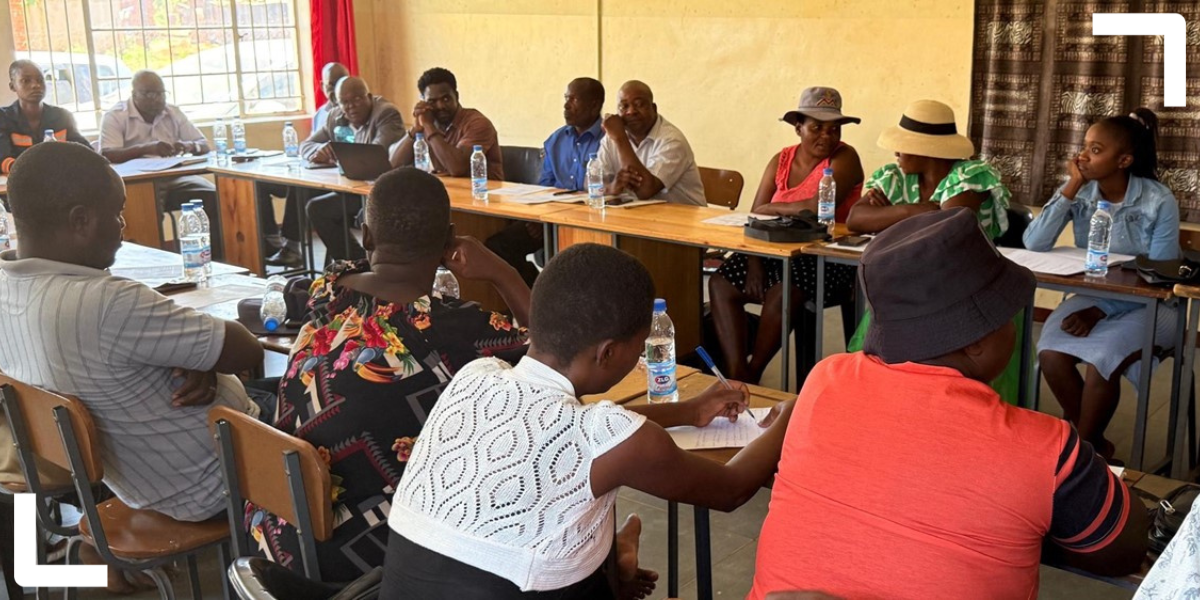By Evans Banana, ACRC Harare uptake officer
The impacts of climate change are already exacerbating the challenges posed by urbanisation in Africa. While the gap between formal and informal settlements – planned and unplanned, legal and illegal – is slowly narrowing, informal settlements continue to be most affected, primarily due to insecure tenure and inadequate access to basic infrastructure resulting in serious health challenges.
For informal settlements, the capacity for resilience remains critically low, leaving them highly vulnerable to both natural and human-made hazards. In response, communities of low-income urban residents are coming up with innovative climate-resilient solutions through locally driven climate adaptation initiatives. Yet while these local solutions show great potential, they enjoy limited institutionalisation and policy support from authorities, constraining their capacity for scaling up and having a broader impact.
ACRC at the Climate and Health Africa Conference (CHAC)
Held in Harare in October 2024, the inaugural Climate and Health Africa Conference (CHAC) provided a platform to unpack the disproportionate impact of climate change on women and children living in informal settlements in Zimbabwe.
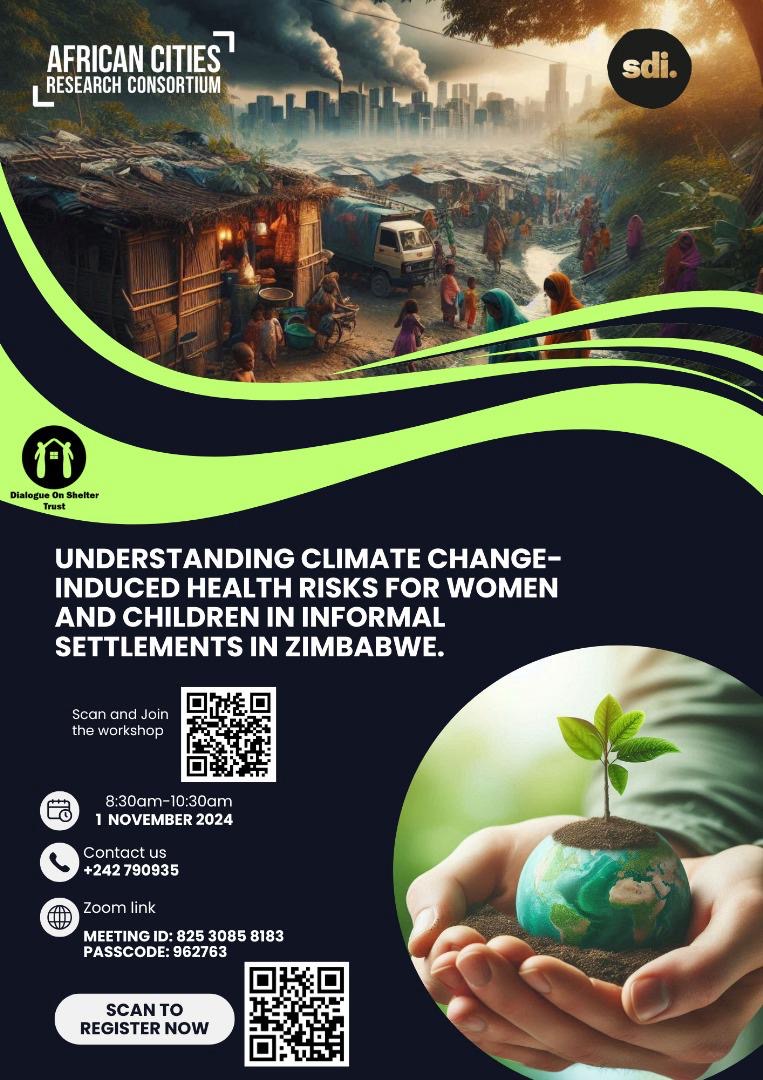
As part of this landmark event, Dialogue on Shelter for the Homeless Trust (DoST) and its Slum Dwellers International (SDI) affiliate, the Zimbabwe Homeless People’s Federation, organised a side event on 1 November. Titled Understanding Climate Change-Induced Health Risks for Women and Children in Informal Settlements in Zimbabwe, the event attracted participants from informal settlements, community-based organisations, state representatives, academia and development agencies.
The side event highlighted pressing climate and health issues affecting women and children in marginalised communities, while providing a unique platform for residents to share locally led adaptation strategies and propose solutions to the daily challenges they face. As a result of this gathering, significant policy shifts were initiated, particularly around methodology and approach. Coinciding with the city’s Environment and Climate Policy making process, the session played a crucial role in encouraging the city to consult informal settlements separately to understand their complexities and harness additional ideas.
A gathering of voices
ACRC’s Harare research team took the opportunity presented by CHAC to share key findings from the programme’s foundation phase – particularly the informal settlements domain. To foster inclusive dialogue, speakers were carefully selected from informal settlers, international organisations, and the City of Harare.
Sekai Catherine Chiremba, one of the key speakers, opened the discussion by sharing her insights into how informal settlements – which are often excluded from development and disaster-response efforts – are disproportionately affected by climate shocks. She explained how the absence of basic infrastructure in these areas increases vulnerability to disasters like droughts, floods and poor energy access, disproportionately impacting women and children.
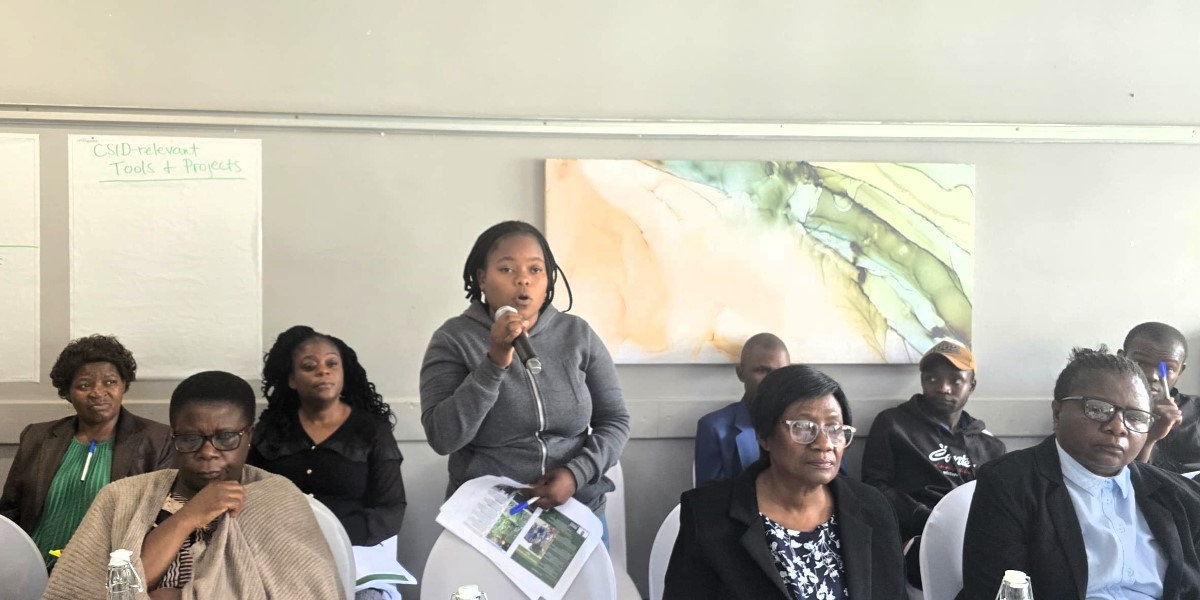
Youth from Epworth settlement participating during the side event.
The second speaker, Lisben Chipfunde from the City of Harare’s City Environment Management Unit (CEMU), provided an overview of how the city is working to tackle multiple challenges sustainably. He discussed the financial and human resource constraints the city faces to maintain and expand the ageing infrastructure. He spoke on the urgent need for deeper collaboration with stakeholders as a way of ensuring inclusive resilience building across the city systems.
Additionally, he presented the Environment and Climate Policy that the city was working on, particularly highlighting its bottom-up approach, which involves consultations at the administrative ward level. However, informal settlers voiced concerns that this approach might overlook their specific needs. In response, the city committed to adjusting the consultation process to ensure that informal settlements would be consulted separately to address their unique challenges and emerging adaptation strategies.
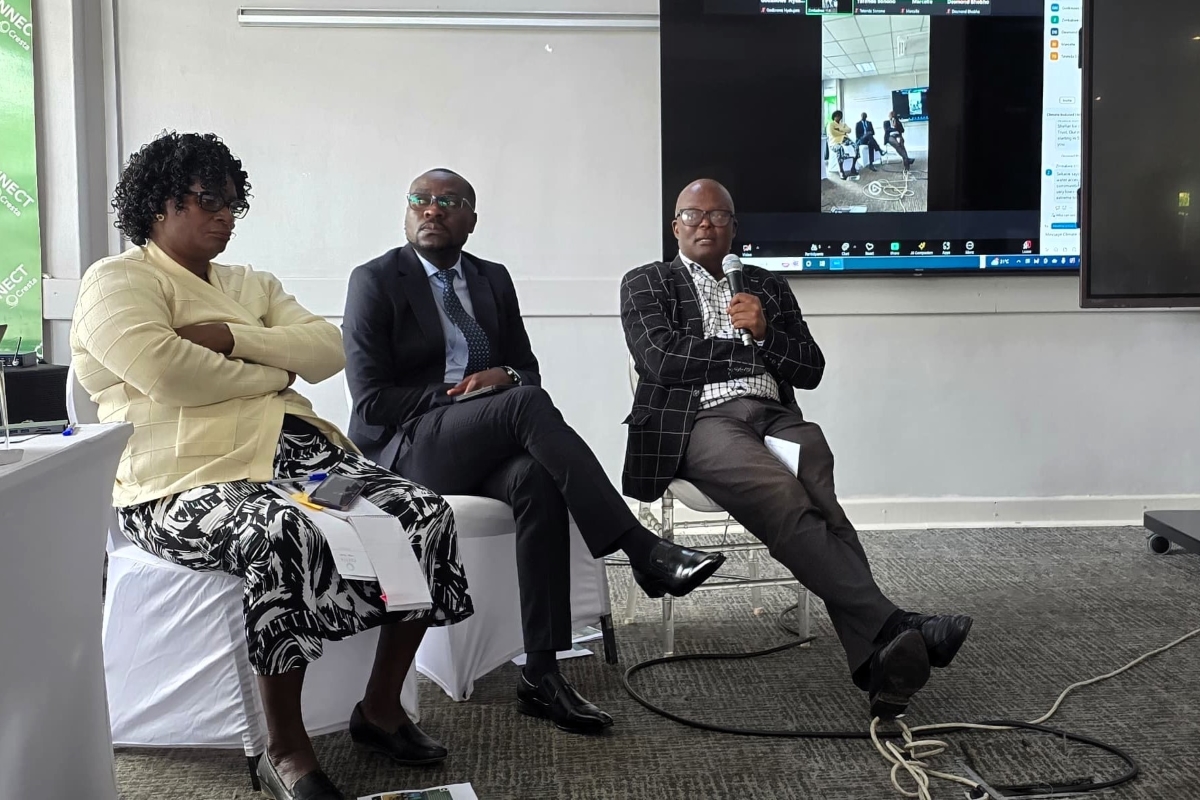
Session key speakers: Sekai Catherine Chiremba (left), Jeremia Mushosho (centre) and Lisben Chipfunde (right).
The third speaker, Jeremia Mushosho from the World Health Organization (WHO), shared global perspectives on the intersection of climate and health, as well as talking about climate finance and how this is being employed in different contexts to address climate impacts. His discussion on climate finance generated significant interest, as participants sought clarity on how financial resources could be more effectively mobilised to address climate and health issues. The event emphasised the importance of long-term strategies to enhance climate action and urban health.
What made the session more transformative was its focus on co-production. ACRC’s Harare city manager, George Masimba, highlighted the two action research projects being implemented in Harare. Specifically, he mentioned the co-production of inclusive infrastructure at the Glen View 8 furniture complex, along with the documentation of climate change impacts in informal settlements and the targeted co-production of infrastructure works in Tafara. He reiterated the need to consolidate lessons from interventions to systematically design appropriate ways for cities to work alongside local communities, not only in responding to crises but in shaping their future development.
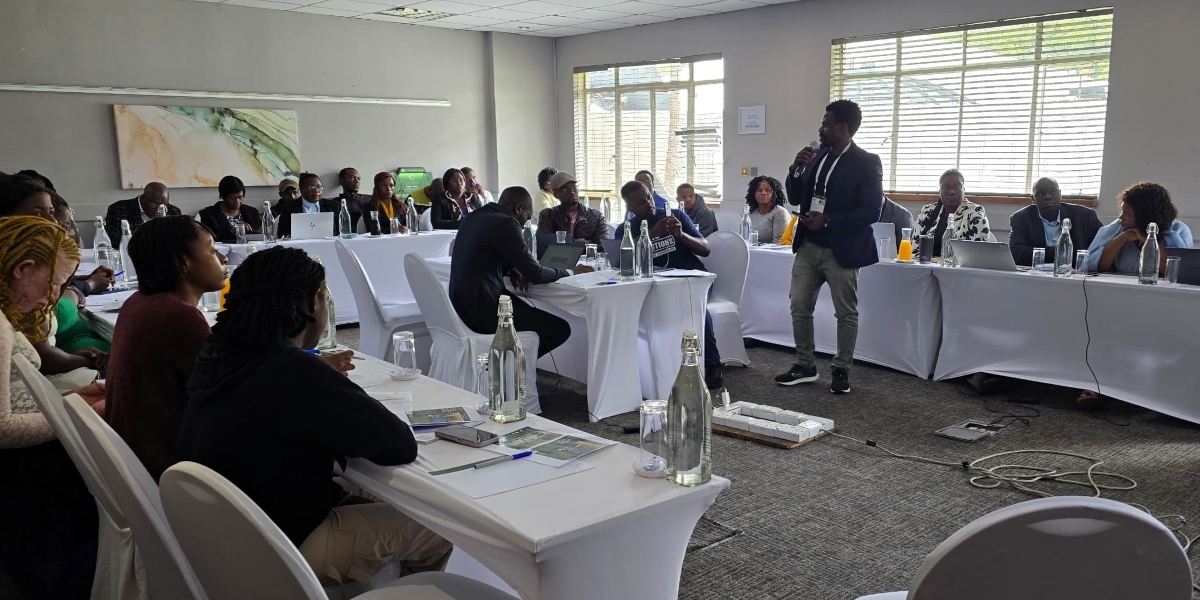
Evans Banana presenting during the side event.
Inclusivity: Shaping policy from the bottom up
In the months since the conference, the participation of the ACRC Harare research team has had ripple effects far beyond the event itself. The City of Harare has started incorporating community feedback into its policy design, recognising that policies can only be effective if they are informed by the local communities who will be most affected by them. The City of Harare’s Environment and Climate Policy methodology is using a bottom-up approach, embracing a more inclusive approach to governance.
To meet this ambition, DoST and the Federation have facilitated additional policy dialogue sessions with several informal settlements in the city. Residents from 12 informal settlements – are Dzivarasekwa Extension, Stoneridge, Hopley, Churu, Tafara, Mabvuku-Chizhanje, Boko Haram, Crowborough Paddocks, Caledonia, Budiriro, Lyndhurst and Hatcliffe – met with city officials to share their experiences and insights, directly informing the policymaking process. These discussions have elevated the voices of informal settlers, transforming their once marginalised status into a central part of the policy review and formulation process.
Specifically, residents identified insecure tenure as the biggest hurdle limiting climate resilience of informal settlements. Communities believe that appropriate regularisation modalities will unlock community potential and empower them to be equal co-production partners. To operationalise this ambition, communities identified the co-generation of climate vulnerability assessments across settlements and co-development of climate action plans as key. Additionally, communities presented the institutionalisation of community participation in infrastructural development, environmental stewardship and the inclusion of slum upgrading as a sustainable way of building resilience in settlements.
The shift is profound. In the past, informal settlements were criminalised and ignored by local authorities. Now, these communities are recognised as essential stakeholders, with the potential to contribute to creating climate-resilient cities and policies. The Federation has also mobilised its members in other city wards, ensuring broader participation in future consultation meetings.
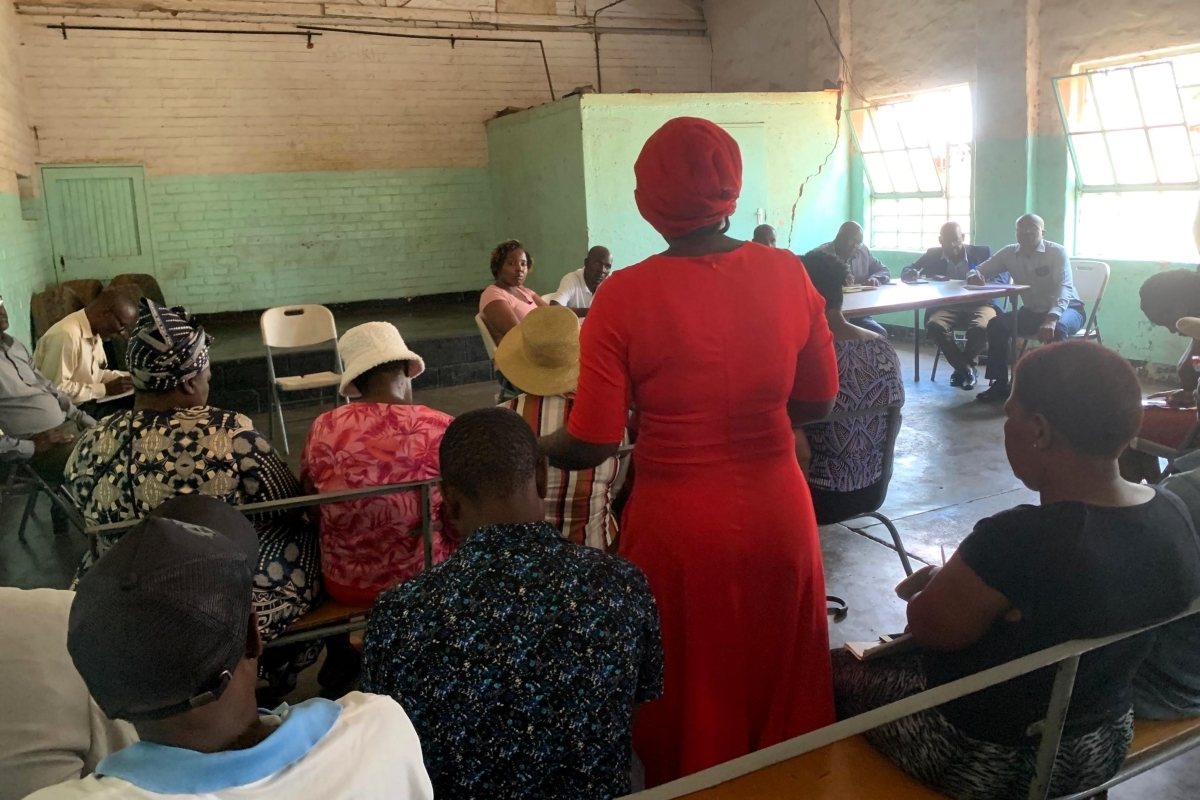
Some of the informal settlers engaging city during the Environment and Climate Policy consultations.
Consolidating the gains from collaboration and co-creation
As the ACRC Harare research team continues to implement action research projects, the lessons learned from these engagements will play a pivotal role in shaping future urban policies. The city has recognised that communities are not a homogeneous group, and the need to further accommodate residents who were once marginalised, such as informal settlers. The knock-on effects of these engagements have enhanced the institutional profile of the alliance as a key player in urban development.
Going forward, with a strong foundation for meaningful collaboration, the ACRC Harare team plans to continue its policy-related engagements and create pathways for innovative pilots to be integrated into actual policies. Through its role in the ACRC Harare action research, DoST has already been invited to join the technical team working on finalising the Environment and Climate Policy, and discussions are underway to explore more inclusive ways of reviewing the city Housing Policy.
Photo credits: Tarisai Manyowa, Teurai Nyamangara and Evans Banana
Note: This article presents the views of the authors featured and does not necessarily represent the views of the African Cities Research Consortium as a whole.
The African Cities blog is licensed under Creative Commons Attribution-NonCommercial-NoDerivatives 4.0 International (CC BY-NC-ND 4.0), which means you are welcome to repost this content as long as you provide full credit and a link to this original post.

